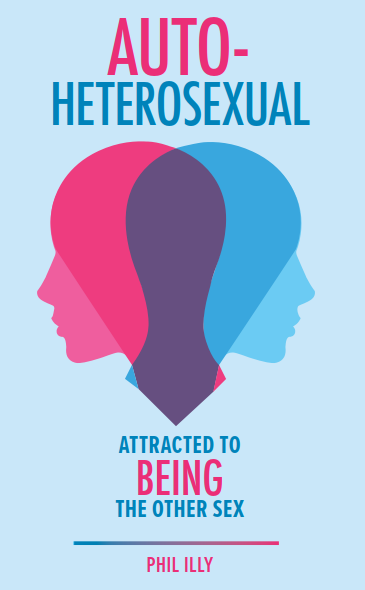From the appendix of Autoheterosexual: Attracted to Being the Other Sex
There are currently millions of pre-transition autoheterosexuals who privately grapple with gender issues, but don’t know why. Many feel confused, ashamed, or alone in their struggle.
In addition, many autoheterosexuals began medical transition before they understood the sexual orientation behind their cross-gender wish, so the consent they gave for such treatment cannot be considered informed.
Thus, widespread ignorance of autoheterosexuality continues to harm autoheterosexuals across the gender transition spectrum. These costs are unacceptable. This epistemic injustice must end.
To end this catastrophic ignorance, autoheterosexuality must be destigmatized and its existence made common knowledge. These twin goals must happen in tandem.
Unfortunately, I can’t achieve this alone. I’ll need help from other self-aware autoheterosexuals.
If you are autoheterosexual and want to help destigmatize our orientation, you can 1) come out and 2) spread knowledge.
By repurposing the strategies and tactics that destigmatized homosexuality and legalized gay marriage, we can destigmatize autoheterosexuality and improve the overall well-being of our kind.
And this time, change will come much faster: we have the internet.
Come Out
For our orientations to be destigmatized, we must come out.
By coming out, we can be better seen and understood by others. Merely by existing openly as ourselves, we can demonstrate that it’s fine to be autohet and that it’s no cause for alarm.
It’s often easiest to start with a close friend who you expect to be supportive. If that goes well, you can expand from there. It’s okay to take your time with this process: coming out slowly is still far better than staying fully closeted.
If you weigh the risks and decide it’s worth coming out as autoandrophilic, autogynephilic, or autoheterosexual, please do so.
Spread Knowledge: Wikipedia
If we are to understand ourselves and be understood by those we love, we must spread knowledge about our orientations.
To achieve epistemic justice, we must seize the memes of production—starting with the single most influential source of knowledge: Wikipedia.
Wikipedia is the first place most people check when they want to learn about something. As a result, knowledge there tends to diffuse outward and find its way into articles, podcasts, social media posts, and other forms of media.
Creating, maintaining, and improving Wikipedia articles pertaining to our sexuality is one of the most accessible and effective ways to spread knowledge about our orientations. By enhancing Wikipedia articles with factual edits that incorporate knowledge from the sexology literature, we can end denial of our existence and help other autosexuals comprehend their experiences.
Each autosexual orientation deserves its own Wikipedia page. For English pages, the titles should adhere to scientific naming conventions (i.e., “auto-X-philia”). Overarching concepts such as “autosexual orientation”, “allosexual orientation”, and “autoheterosexuality” deserve their own pages as well.
The English pages are the most crucial. They are also where we will face the greatest resistance. To bypass this obstacle and diversify our campaign beyond the Anglosphere, autosexuals who speak other languages can create and edit Wikipedia pages in those languages.
Due to the huge demographic overlap between autists and autosexuals, quite a few of us have the capacity to develop a special interest in particular topics. This single-minded focus often yields a deep, detailed understanding of the subjects we love. In addition, many of us have a stubborn insistence on accuracy and truth. Thus, many of us have what it takes to be excellent Wikipedia contributors.
As important as Wikipedia is, however, not all of us have the inclination or temperament to be effective there, and that’s okay. There are many other ways you can help spread knowledge of our orientations.
Spread Knowledge: Speak Up
Do you ever make comments or posts on the internet? Do you have a podcast, make videos, or do livestreams?
No matter what medium you work in, you can help by speaking of autoheterosexuality in a calm, accepting, matter-of-fact manner that treats it as an obviously real phenomenon.
When you feel ready to speak about your personal experience with autoheterosexuality, please do. Speaking of your direct experience will help other autohets feel less alone. It’ll also help humanize the autohet experience for people who don’t experience cross-gender attraction themselves.
Be unapologetic: you have nothing to apologize for. Nobody gets to choose their sexual orientation, and autoheterosexuality is a perfectly fine orientation to have. Like any orientation, there are acceptable and unacceptable ways to express it, but simply having the orientation is itself morally neutral.
We will sometimes get pushback from trans people and those who consider themselves allies. We will also get pushback from conservatives and certain types of feminists. Although these groups have drastically different ideologies and beliefs, all of them will use the twin tactics of inciting shame and disgust.
Do not let this knock you off-center. Remain calm. Take some deep breaths. When possible, be kind.
By keeping your cool while others are losing their shit, the ideas you share are more likely to take root in the brains of others.
When engaged in online discourse, it isn’t important to convince your conversation partners that you are right. On all social media platforms, the vast majority of users are lurkers. Thus, what matters most is creating the impression among these unseen witnesses that you are comparatively more knowledgeable, reasonable, and thoughtful. Always consider the lurker: they are the true target of your persuasion efforts.
To make your good intentions apparent, make it clear up-front that you accept trans people regardless of what etiology they are. If you think both types of trans people should have access to gender-affirming medical care, say so. If you think both types of trans people should be treated respectfully and protected from discrimination, say so.
You will likely find that some messages play better with different audiences. Once you notice these patterns, consider the social context you’re in and adjust accordingly.
Connect with other self-aware autoheterosexuals and signal boost each other. This will help us find each other and build community. By keeping an open line of communication among ourselves and having each other’s back, we will surmount the obstacles that lie ahead.
We will undoubtedly succeed at mainstreaming awareness of our orientations: ideas that accurately describe reality tend to persist and spread, and autoheterosexuality is obviously real.
If anything, the real challenge lies in destigmatizing it. But we will succeed at this too. By sharing our experiences and speaking to the romantic and sentimental side of autoheterosexuality, we can teach people not to fear the love that underlies our commitment to the cross-gender path.
Speak With Me
Are you an autosexual person who wants to discuss your experiences with someone who actually understands what it’s like? Are you in a relationship with an autosexual person and want to understand them better? Sign up to speak with me! I’m available to speak via Zoom or phone.






Are you an actual, factual ally or a troll? Talking about transgender identity as an “ism” and describing an “attraction to being the opposite sex” have no relationship to the trans experience as I understand it. Instead, most transgender people seem to describe a stark revulsion against being the gender they were assigned at birth.